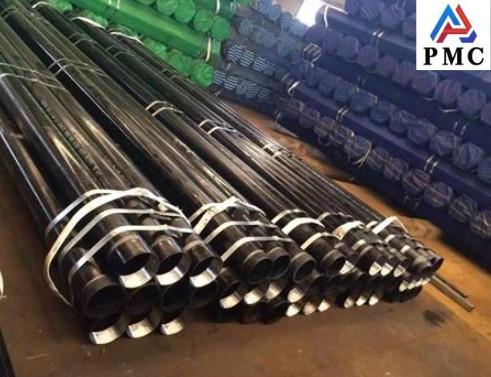
Standard for SMLS Pipes for Pipelines
SMLS pipes (seamless pipes)for pipelines are commonly used to transport oil, natural gas, water, and other fluids. These applications place extremely high demands on pipeline safety, reliability, and durability. Therefore, smls pipes for pipelines must meet stringent international and national standards. The following is a summary of some of the most commonly used and important standards for smls pipes for pipelines:
API SPEC 5L (American Petroleum Institute Standard 5L)
Overview: This is the most widely accepted and used line pipe standard in the global oil and gas industry. It covers seamless and welded steel pipes used for oil and gas transportation pipelines.
Key Features:
PSL1 and PSL2: API 5L divides pipes into two product specification levels: PSL1 and PSL2.
PSL1: Suitable for general pipeline applications, with basic requirements on chemical composition, mechanical properties, non-destructive testing, etc.
PSL2: Suitable for more stringent applications, based on PSL1, it adds stricter chemical composition control (such as carbon equivalent requirements), higher mechanical properties (such as impact toughness requirements, especially for low-temperature applications), and stricter non-destructive testing and product traceability requirements.
Steel grade: Various steel grades are specified from Grade A to Grade X (such as B, X42, X52, X60, X65, X70, X80, etc.). The number represents the yield strength (in thousands of pounds per square inch, ksi). For example, API 5L X52 means the minimum yield strength is 52 ksi.
Corrosion resistance: Some high-grade line pipes also consider resistance to sulfide stress corrosion cracking (Sour Service) and carbon dioxide corrosion (CO2 Corrosion).
Application: long-distance oil and gas transmission pipelines, gathering pipelines, gas distribution systems, etc.
ASTM / ASME (American Society for Testing and Materials / American Society of Mechanical Engineers)
Although API 5L is the preferred standard for line pipe, the following ASTM/ASME standards are also commonly used in internal piping systems in refineries, chemical plants, and power plants, or as a supplement to API 5L:
1. ASTM A106 / ASME SA-106
Overview: This standard specifies seamless carbon steel nominal pipe for high-temperature service. It covers three grades: A, B, and C, with Grade B being the most commonly used.
Application: Suitable for piping systems in industries such as petroleum, natural gas, power generation, and petrochemicals that must withstand high temperatures and pressures.
2. ASTM A333 / ASME SA-333
Overview: This standard specifies seamless carbon and alloy steel pipes for cryogenic service. It covers grades such as Gr.1, Gr.3, and Gr.6, with Gr.6 being the most commonly used in cryogenic applications.
Application: Suitable for pipelines used in extremely cold environments, such as liquefied natural gas (LNG) transportation and cryogenic storage.
3. ASTM A335 / ASME SA-335
Overview: This standard specifies seamless ferritic alloy steel pipe for high-temperature service. It covers grades P1, P2, P5, P9, P11, P22, P91, and P92, all of which are typical chromium-molybdenum alloy steels.
Applications: Suitable for high-temperature and high-pressure steam piping, boiler and superheater tubes, and petroleum cracking furnace tubes. It exhibits excellent creep resistance and high-temperature strength.

ISO 3183 (International Organization for Standardization)
Overview: This is an international standard that is highly coordinated with API 5L and also specifies the technical requirements for steel pipes used in pipeline transportation systems in the oil and natural gas industries, including seamless and welded pipes.
Relationship: ISO 3183 and API 5L are equivalent in many respects, and many manufacturers and projects adhere to both standards or one of their revisions.
GB/T 9711: Petroleum and Natural Gas Industry - Technical Delivery Conditions for Steel Pipes
This standard is highly consistent with API 5L and ISO 3183, and is the main implementation standard for domestic oil and gas pipelines. It is also divided into PSL1 and PSL2 grades.
It covers various steel grades, such as L245 (B), L290 (X42), L360 (X52), L415 (X60), L450 (X65), L485 (X70), etc., where the number after L represents the minimum yield strength (in megapascals, MPa).
GB/T 8163: Seamless steel pipes for conveying fluids
Although not as professional as GB/T 9711, carbon steel or low alloy steel seamless pipes under this standard can also be used for some general fluid transportation and pressure requirements are not so extreme.
GB/T 5310: Seamless steel tubes for high-pressure boilers
It is mainly used in high temperature and high pressure environments such as power plants and boilers. Some grades (such as 20G, 12Cr1MoV, 15CrMoG, etc.) can also be found in certain pipeline applications.
Factors to consider when selecting seamless steel pipe standards for pipelines
Project location and export requirements: Determine which country or region's standards must be followed.
Media type: The corrosive nature of the transported medium (sour gas, CO2, chloride ion, etc.), temperature, and pressure.
Environmental conditions: Onshore, offshore, extremely cold regions, seismic zones, etc.
Design specifications: The project's engineering design specifications will clearly define the standards for the selected pipeline materials.
Cost-performance balance: Select an economically reasonable standard and steel grade while meeting safety and performance requirements.
Read more: Standard for SMLS Pipes for Fluids
- 【Prev】 : OCTG Drill Pipe
- 【Next】 : Seamless Pipe Material for Structure


